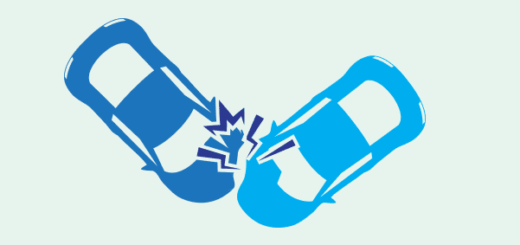What Happens If You Get Into an Accident Without Car Insurance?
Our goal is to give you the tools and confidence you need to improve your finances. Although we receive compensation from our partner lenders, whom we will always identify, all opinions are our own. By refinancing your mortgage, total finance charges may be higher over the life of the loan.
Credible Operations, Inc. NMLS # 1681276, is referred to here as “Credible.”
Car insurance is a vital way to financially protect both you and other drivers if you’re in an accident. It’s so important, nearly every state requires you to carry car insurance as a prerequisite to maintain your driver’s license. Choosing to drive without insurance can have serious financial and legal repercussions should you get into an accident.
Here’s what you need to know about getting into an accident without car insurance:
What happens when you’re in an accident without car insurance?
If you’re in an accident without car insurance, what happens next depends on which state you’re in, who’s at fault in the crash, and whether the other driver has insurance.
If the accident occurs in a state that requires insurance
The majority of U.S. states require you to carry car insurance if you drive. Even if you’re not in an accident, you may have your driver’s license suspended or revoked or your car impounded if you’re found to be driving without insurance. You may even be arrested. If you’re in an accident, however, the consequences can be more severe. You may face fines and mandatory revocation of your license and vehicle registration.
If the accident occurs in a state that doesn’t require insurance
Only two states don’t legally require you to carry car insurance: New Hampshire and Virginia. Both states, however, require you to be able to cover the cost of damages and injuries you cause while driving uninsured.
In Virginia, you must pay an annual $500 Uninsured Motor Vehicle fee to drive without insurance. If you haven’t paid the fee, you may face a suspended license, a $600 fine, a reinstatement fee, and be required to file a Financial Responsibility Insurance Certificate (SR-22) with the Virginia Department of Motor Vehicles for three years.
As long as you follow the state’s rules, you won’t face legal consequences for driving without insurance. However, you’ll still be liable financially for damages and injuries you cause.
Who pays when you’re in an accident without car insurance?
Car accidents can be costly, resulting in both property damage and injuries. Damages can occur to vehicles involved in the crash, as well as surrounding property (light poles, for instance). Injuries can result in medical bills, lost wages, compensation for pain and suffering, as well as other expenses.
The average cost of an accident that doesn’t cause injury was $4,700 per vehicle involved in 2020, according to the National Safety Council. With possible injuries, the average cost rose to $23,900, and fatal accidents resulted in average costs of $1.75 million.
Whether you pay these costs depends on if you have insurance, the state you’re in, and if you’re at fault in the accident.
If you’re at fault
In a majority of states, the person who’s responsible for causing the accident is required to pay for the damages and injuries caused, including covering any medical bills. If you have insurance, your insurance carrier will cover the costs.
If you don’t have insurance, however, the liability likely falls on you personally. The other driver or their insurance provider may be able to sue you to recover the costs paid as a result of the accident.
If you’re not at fault
Again, in most states, the person who’s at fault in the accident is responsible for paying the damages. If you’re in an accident and the other driver is at fault, their insurance provider will likely compensate you for the damages and injuries you sustain.
But if you’re uninsured and live in a “no pay, no play” state, this amount may be limited. These states have laws that stipulate uninsured drivers can’t get compensation for things like emotional distress or pain and suffering — even if the other insured driver was at fault in the accident.
If the other driver is also uninsured, you may be able to sue them to recover the money owed. However, even if you’re not at fault in the accident, you may still face legal consequences for driving uninsured.
Check Out: Medical Payments Coverage: What It Is and How It Works
If the accident occurs in a “no-fault” state
In some states, each driver files a claim with their own insurance carrier to pay for injuries in a car wreck. In these “no-fault” states, you’re typically required to buy personal injury protection (PIP) insurance, which will cover you in an accident. The no-fault laws generally don’t apply to property damage (like dents in your vehicle). If you cause the accident, you’ll still be responsible for paying for those expenses.
If you’re in an accident in a no-fault state, you may be on the hook to pay out of pocket for your medical bills no matter who causes the accident, unless you have insurance. However, even no-fault states typically allow you to sue for damages if you’re seriously injured in the accident.
Here are the no-fault states and their minimum PIP requirements:
| No-Fault State | Personal Injury Protection Coverage Minimum |
|---|---|
| Florida | $10,000 |
| Hawaii | $10,000 |
| Kansas |
|
| Kentucky | $10,000 |
| Massachusetts | $8,000 |
| Michigan | $50,000 |
| Minnesota | $40,000 |
| New Jersey | $15,000 |
| New York | $50,000 |
| North Dakota | $30,000 |
| Pennsylvania | Only liability insurance required:
|
| Utah | $3,000 |
What are the penalties for driving without car insurance?
Every state that requires drivers to carry car insurance has penalties for people driving without it. These penalties vary from state to state, but commonly include:
- Suspension of your driver’s license
- Suspension of your vehicle’s registration
- Impoundment of your vehicle
- Fines and civil penalties
- Requirement to carry high-risk insurance
- Criminal charges
How much car insurance do I need?
States that mandate car insurance typically have minimum levels of coverage that you need to buy. These minimums generally include:
- Bodily injury liability: Personal liability coverage handles medical bills and other expenses related to injuries sustained in a car accident when you’re at fault. Generally, your policy must include a minimum of between $15,000 and $50,000 of coverage per person injured, with a limit between $30,000 and $100,000 for all people injured in an accident. Nearly every state requires this type of insurance.
- Property damage liability: This type of insurance pays for damage to vehicles and other property in an accident when you’re at fault. States typically require a minimum between $5,000 and $25,000 for this type of coverage. Like bodily injury liability, almost every state requires this type of insurance.
- Uninsured and underinsured motorist coverage: This insurance typically pays for your medical bills and other related expenses if you’re in a car accident with someone who’s uninsured or doesn’t have enough insurance. About half of U.S. states require you to carry this type of insurance, with minimum coverage levels that are roughly the same as your liability insurance.
In many cases, you’ll want to buy more insurance than the legally required minimum. If you cause an accident that costs more than your coverage limit, you may need to pay the difference out of pocket. An insurance agent can typically help you determine the coverage that makes sense for you based on your financial situation.
You may also consider adding the following types of insurance:
- Umbrella liability insurance: These policies cover you if you’re found responsible for paying more than your standard insurance policy covers. Umbrella coverage is relatively inexpensive and can provide you limits of $1 million or more.
- Collision insurance: These policies pay for damage to your vehicle if you run into something other than another vehicle, such as a light pole or parking structure.
- Comprehensive insurance: These policies cover damage to your car caused by something other than a collision, such as fire, theft, falling trees, or natural disasters.
Learn More: How Long After a Car Accident Can You File a Claim?
How to find affordable car insurance
Don’t run the risk of driving without car insurance. You may find yourself in legal trouble and financial danger if you’re in an accident. You can likely find affordable auto insurance if you follow these steps:
- Research your state’s requirements. Chances are, you live in a state that requires you to buy car insurance if you drive. State Department of Motor Vehicles websites typically list the minimum requirements for auto insurance in the state. This will help you determine which types of coverage you’ll need.
- Compare quotes from multiple providers. Many insurance carriers allow you to quickly get a quote for an auto insurance policy by filling out an online form. You’ll need to provide information on your vehicle, your driver’s license number, and personal details such as where you live and where you typically keep your car. As you compare quotes, make sure the coverage levels and deductibles are roughly the same to make sure you’re making an apples-to-apples comparison.
- Raise your insurance score. Most car insurance providers use a credit-based insurance score to help determine the price you’ll pay for car insurance. This is because research has shown that people with lower insurance scores are more likely to file a claim. You may be able to ask about your insurance score when you’re getting quotes. If you live in California, Hawaii, Maryland, Massachusetts, Michigan, Oregon, Washington, or Utah, your state bans or limits the use of credit scores to determine your rate.
- Check out discounts. You may be able to save money on your car insurance policy by bundling policies — meaning you take out multiple types of insurance (like home and auto insurance) from the same carrier. You may also qualify for discounts if you take a driver education course, maintain good grades if you’re a student, or are a member of an organization that has a group rate with a particular insurance provider.
- Increase your deductible. A deductible is the amount you pay out of pocket when you file a claim before your insurance kicks in to cover the rest. The higher your deductible, the lower your premium costs tend to be. Run the numbers and consider a higher deductible to save you money each month.
- Drive safely. Even if you’re not in an accident, unsafe driving can be costly. Speeding tickets and other violations can increase the cost of your car insurance. Some insurers also offer “safe driver” discounts, meaning you can save money after a period of time with no tickets or accidents.
Disclaimer: All insurance-related services are offered through Young Alfred.




